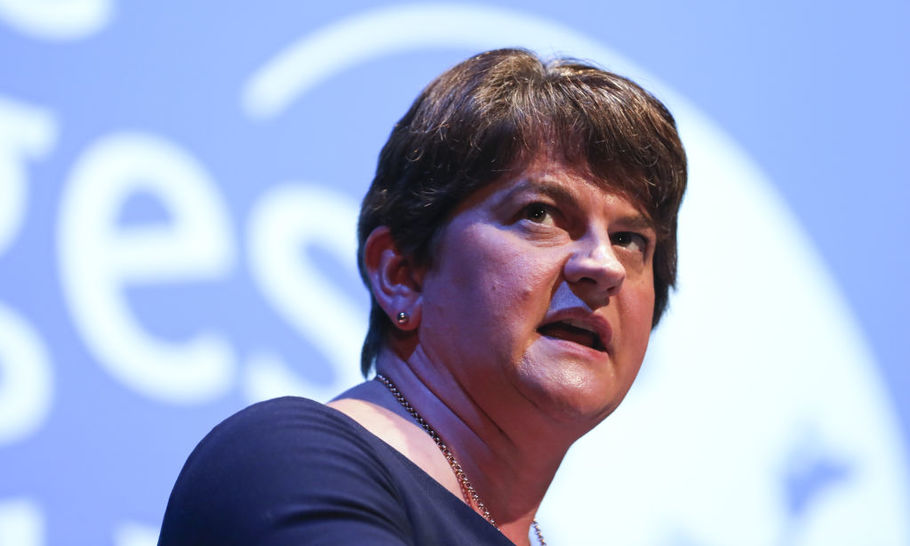The DUP wants a deal, but not at the expense of the Union

Arlene Foster, at an event at the Conservative Party conference in Manchester, UK 2019. Photographer: Chris Ratcliffe/Bloomberg via Getty Images
Frequently, it’s asserted that the DUP wants a no-deal Brexit, or that secretly it would like a hard border in Ireland. Neither of these claims is remotely plausible. Not only does this analysis ignore every statement that the party has made on both topics — it underestimates the political pressures that have been exerted on Northern Irish Unionists ever since the EU referendum.
When Arlene Foster, the DUP’s leader, agreed a “confidence and supply” arrangement to support Theresa May’s Conservative administration after the 2017 election, her party was in buoyant mood. It claimed to have delivered an extra £1 billion for public services in Northern Ireland and secured influence at the heart of government.
During the Tory conference that year, a party better known for quaffing prodigious quantities of orange squash at teetotal soirées entertained Conservative activists with champagne. As the DUP holds its 2019 event at the Conservatives’ Manchester conference this week, the atmosphere might be a little more sombre. Their MPs can no longer offer the government a working majority in Parliament and they risk being blamed for blocking Brexit, if they continue to oppose the EU’s “backstop” plans for the border.
For the last three years, the presence of DUP representatives at Conservative conferences (and Conservative speakers at DUP conferences) has been a novel expression of the two parties’ awkward alliance. It’s also a source of distress for the small number of Tory activists in Northern Ireland, who still hope for an electoral breakthrough that will bring the province’s party system in line with the rest of the UK.
The Conservatives were previously linked closely to the DUP’s rival, the Ulster Unionist Party, which for decades formed Northern Ireland’s political establishment. At Westminster, UUP MPs sat on the Tory benches until the 1970s, when unionism fractured over the Sunningdale Agreement and Edward Heath dissolved the parliament at Stormont.
David Cameron revived the relationship prior to the 2010 general election and the two parties stood joint candidates under the banner “Conservatives and Unionists”, or UCUNF. Despite coming within a whisker of winning in at least two constituencies, the project was unsuccessful, partly thanks to the vicious response it drew from the DUP. “I want an MP who answers to us — not the Tories,” read one of the party’s campaign billboards during that election.
Times have changed. Now the DUP’s leader, Arlene Foster, is a popular and well-received speaker at Conservative fringe events, if not quite part of the Tory family.
This year, wherever she speaks, the fraught question of the Irish backstop is the dominant topic. At a packed Policy Exchange event on Sunday afternoon, Foster rejected the idea that her party might accept extra regulatory checks between Northern Ireland and the mainland, as a way of getting past the current impasse on the EU Withdrawal Agreement. She said that a time-limited backstop was “something we would look at”, but acknowledged that such an arrangement had already been ruled out by the Irish government.
Foster’s red line is still that “we cannot have an internal (UK) customs border” down the Irish Sea, but she emphasises that “no-one wants full infrastructure” at the frontier between Northern Ireland and the Republic. She also admits that she is more worried about a no-deal Brexit than her fellow panellist, the high-profile Labour Brexiteer, Kate Hoey MP.
As the conference takes place, the Government is finalising its proposals to replace the backstop, which it intends to table later this week. This document is expected to include plans for all-Ireland rules on animal health, a mechanism for consulting the Stormont Assembly and an arrangement aimed at avoiding customs posts at the border. Unionists will be most worried by suggestions that Boris Johnson may accept some checks in the Irish Sea for non-agricultural goods.
In one of the more intriguing exchanges during the Policy Exchange event, Arlene Foster was questioned about her relationship with the Prime Minister. “I have been asked about trusting Boris Johnson,” she responded, “I wasn’t ever asked about (trusting) Theresa May — and, frankly, I should have been.” The DUP leader now claims that Mrs May tried to “bounce” her party into accepting the draft Withdrawal Agreement, including the backstop.
Many inaccurate analyses of Foster and her party seem to miss the basic fact that its central purpose is to protect the Union between Great Britain and Northern Ireland. Sometimes the judgements that it makes while pursuing this objective are faulty and self-defeating. Sometimes its parochial attitudes conflict with the wider interests of the United Kingdom. But the idea that it will eventually drop its objections to an Irish Sea border, and the notion that it is motivated more by the pursuit of a no-deal Brexit than the protection of links between Northern Ireland and the mainland, are equally misplaced. As the Brexit negotiations appear to be reaching their climax, the future of the Union should not rely only upon shifting relationships between the Conservatives and the DUP.
Lord Trimble’s political career was destroyed after he negotiated the Belfast Agreement in the teeth of fierce opposition from the Reverend Ian Paisley and his party, the DUP. In Sunday’s Irish Examiner, the former Ulster Unionist leader wrote, “the backstop undermines the core principles of the agreement: consent and agreement between equals that runs across all three of its strands — and it changes the status of (Northern Ireland) contrary to the Good Friday Agreement.”
Nobody who values Northern Ireland’s place in the Union can possibly accept the EU’s plan to drive an economic, social and political wedge between the province and the rest of the United Kingdom.





